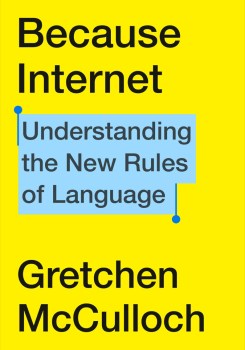Studying Language In The Age Of The Internet
In this excerpt from ‘Because Internet,’ Gretchen McCulloch explains why the internet age is a golden one for linguists.
The following is an excerpt of Because Internet: Understanding the New Rules of Language by Gretchen McCulloch.
Imagine learning to talk from recordings rather than people. If you learned how to have a conversation from movies, you might think that people regularly hang up the phone without saying goodbye and no one ever interrupts anyone else. If you learned to think out loud from news programs, you might believe that no one ever “ums” or waves their hands while searching for an idea, and that people swear rarely and never before ten p.m. If you learned to tell stories from audiobooks, you might think that nothing much new had happened with the English language in the past couple hundred years. If you only ever talked when you were public speaking, you’d expect that talking always involves anxious butterflies in your stomach and hours of preparation before facing an audience.

Because Internet: Understanding the New Rules of Language
Of course, you did none of these things. You learned to speak English domestically, conversationally, and informally long before you could sit through an entire news report or deliver a speech. You might never be wholly comfortable with public speaking, but of course you can complain about the weather to a friend. Sure, they both involve moving the same body parts, but they’re hardly the same task at all.
And yet this is exactly how we all learned to read and write. When we think about writing, we think about books and newspapers, magazines and academic articles—and the school essays in which we tried (and mostly failed) to emulate them. We learned to read a formal kind of language which pretends that the past century or two of English hasn’t really happened, which presents words and books to us cut off from the living people who created them, which downplays the alchemy of two people tossing thoughts back and forth in perfect balance. We learned to write with a paralyzing fear of red ink and were taught to worry about form before we even got to consider what we wanted to say, as if good writing were a thing of mechanistic rule-picking rather than of grace and verve. Naturally, we’re as intimidated by the blank page as we are by public speaking.
That is, we were until very recently. The internet and mobile devices have brought us an explosion of writing by normal people. Writing has become a vital, conversational part of our ordinary lives. In the year 800, Charlemagne managed to get himself crowned as Holy Roman Emperor without being able to sign his own name. Sure, he had scribes to write up his charters, but illiterately running an empire? Today it’s hard to imagine even organizing a birthday party without writing. One type of writing hasn’t replaced the other: the “Happy Birthday” text message hasn’t killed the diplomatic treaty. What’s changed is that writing now comes in both formal and informal versions, just as speaking has for so long.
We write all the time now, and most of what we’re writing is informal: our texts and chats and posts are quick, they’re conversational, they’re untouched by the hands of an editor. If you define a “published” writer as someone who’s had something they’ve written reach over a hundred people, practically everyone who uses social media qualifies—just make an announcement post about a new job or a new baby. It’s not that edited, formal writing has disappeared online (there are plenty of business and news sites that still write much like we did in print), it’s that it’s now surrounded by a vast sea of unedited, unfiltered words that once might have only been spoken.
I’m a linguist, and I live on the internet. When I see the boundless creativity of internet language flowing past me online, I can’t help but want to understand how it works. Why did emoji become so popular so quickly? What’s the deal with how people of different ages punctuate their emails and text messages so differently? Why does the language in memes often look so wonderfully strange?
I’m not alone in wondering about these things. When I started writing about internet linguistics online, I quickly ran into more follow-up questions from readers than just another article could answer. I went to conferences and dived into research papers and ran a few of my own queries. I realized that in many cases there were answers, just not from an internet native speaker, not all together in one place, not in a form that’s fun to read regardless of how much you already know about linguistics. So I wrote this book.
Linguists are interested in the subconscious patterns behind the language we produce every day. But traditionally, linguistics doesn’t analyze writing very much, unless it’s a question about the history of a language and written records are all we have. The problem is that writing is too premeditated, too likely to have gotten filtered through multiple hands, too hard to attribute to a single person’s linguistic intuitions at a specific moment. But internet writing is different. It’s unedited, it’s unfiltered, and it’s so beautifully mundane.
And, as I’ve continued rediscovering with every chapter of this book, when we analyze the hidden patterns of written internet language, we can understand more about our language in general.
From the book, Because Internet: Understanding the New Rules of Language. Copyright ©2019 by Gretchen McCulloch. Reprinted by permission of Riverhead Books, an imprint of Penguin Random House LLC
Invest in quality science journalism by making a donation to Science Friday.
Gretchen McCulloch is a linguist and writer. She gave a presentation on linguistics and emoji at the 2016 SXSW conference. She’s based in Montreal, Canada.